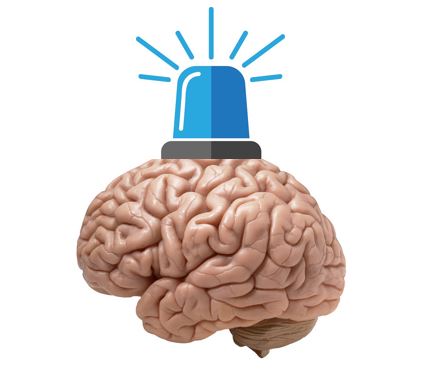
28 Aug REM sleep silences the siren of the brain
Whenever something frightening or upsetting happens it does not go unnoticed. Fortunately for many the experience passes, however for some it is not so easy to recover from, or adapt to the distress.
What happens in our brain during sleep may have a big influence on this, a recent study from the Netherlands has revealed, and in particular how restless our dream (REM) sleep is.
So, what is happening during your sleep to be able to bear better tomorrow what you are distressed about today?
A team of researchers have shown that being exposed to an unpleasant trigger, such as a bad odour, switches on the amygdala, which acts like a siren in your brain to alert you. In order for your brain to continue to function properly it must then be switched off at some point. They discovered during an overnight study that good sleepers were able to silence, or ‘switch off’ the siren in their brains as opposed to restless REM sleepers. Here is what they found:
“During sleep, ‘memory traces’ of experiences from the past day are spontaneously played back, like a movie. Among all remnants of the day, a specific memory trace can be activated by presenting the same odour as the one that was present during the experience while awake. Meanwhile, memory traces are adjusted during sleep: some connections between brain cells are strengthened, others are weakened. Restless REM sleep disturbs these nocturnal adjustments, which are essential for recovery and adaptation to distress.
The finding can be of great importance for about two-thirds of all people with a mental disorder, as both restless REM sleep and a hyperactive amygdala are the hallmarks of post-traumatic stress disorder (PTSD), anxiety disorders, depression and insomnia. People with PTSD carry their traumatic experience to the next day: people with an anxiety disorder take their greatest fear with them, people with depression their despair, and people with chronic insomnia their tension.”
Story Source:
Netherlands Institute for Neuroscience – KNAW. “REM sleep silences the siren of the brain: Restless REM sleep a risk for many mental disorders?” ScienceDaily. ScienceDaily, 11 July 2019. <www.sciencedaily.com/releases/2019/07/190711141258.htm>.
Journal Reference:
Rick Wassing, Oti Lakbila-Kamal, Jennifer R. Ramautar, Diederick Stoffers, Frans Schalkwijk, Eus J.W. Van Someren. Restless REM Sleep Impedes Overnight Amygdala Adaptation. Current Biology, 2019; DOI: 10.1016/j.cub.2019.06.034

